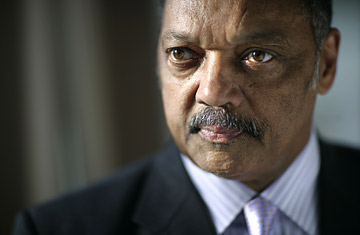
Jesse Jackson remembers this: Dr. King was tired and thinking of retiring from the civil rights movement. After all, he'd marched in some of the most volatile, unwelcoming places in the country as well as been jailed and nearly fatally stabbed.
King considered becoming a full-time author or accepting a position with his alma mater, Morehouse College. But his resolve to continue was suddenly refreshed.
"He said, 'You know, we can't now. We've got to go on, we've got to turn a minus to a plus, like we did before,'" recounts Jackson. "It's like he preached himself out of a depression. Ours turned out to be an interesting session that Saturday before going into Memphis, a kind of prelude."
On April 3, 1968, King had been contemplative and somewhat sad. "He sat in his room most of that day reminiscing about his past. About how his dad met his granddad, the Rev. A.D. Williams, and how his dad met his mom, kind of reminiscing a lot that day," says Jackson, then a 27-year-old aide to King.
That evening, King wanted to stay in his motel room at the Lorraine and work on moving forward with the Poor People's Campaign, which the SCLC had postponed in order to support Memphis' striking garbage workers. King sent Jackson and his other associates, including Rev. Ralph Abernathy, to Mason Temple to attend a rally.
"So Ralph said to me 'Jesse, they're not cheering us, they're cheering because they think Martin is behind us.' And we laughed about it. So we went down to the front of the church and we called Dr. King and said, 'You really ought to come.'"
King did come that rainy evening to the church, but was only supposed to speak a few minutes after Abernathy's introduction.
"He got up without a single note and began to reminisce," Jackson recalled. "He kind of walked back through history, as he had done that earlier that day, but talking about his own family life. We had no way of knowing the kind of pressures he was under, that he internalized and simply would not share."
King's voice grew increasingly electric, increasingly powerful. And it built to these words that now echo in history:
Well, I don't know what will happen now. We've got some difficult days ahead. But it doesn't matter with me now. Because I've been to the mountaintop. And I don't mind. Like anybody, I would like to live a long life. Longevity has its place. But I'm not concerned about that now. I just want to do God's will. And He's allowed me to go up to the mountain. And I've looked over. And I've seen the promised land. I may not get there with you. But I want you to know tonight, that we, as a people, will get to the promised land. And I'm happy tonight. I'm not worried about anything. I'm not fearing any man. Mine eyes have seen the glory of the coming of the Lord.
Jackson said King's mood was much better the next day. In the evening, they prepared for dinner at Rev. Samuel "Billy" Kyles home and King joked to Jackson: "Jesse, we're on the way to Rev. Kyles home for dinner, and you don't have a tie on." "I said, 'Doc, the prerequisite for eating is an appetite, not a tie.'"
King then gestured to Ben Branch, the leader of a band Jackson had brought down to Memphis. "He said, 'Ben, be sure to play my favorite song tonight — Precious Lord.'"
A split second later, a sharp, high sound cracked the air. Martin Luther King fell to the ground, victim of a shot to the neck.
Jackson went to call Coretta Scott King. "Those eight or ten steps to that phone was like a long journey."
But Jackson said that he and his colleagues, despite losing their leader, would not let a single bullet stop their movement. The SCLC continued the Poor People's Campaign, although the Economic Bill of Rights they fought for was never passed in Congress.
Jackson went on to expand his arm of Operation Breadbasket, which evolved into Operation PUSH, and eventually into the Rainbow/PUSH Coalition. In both 1984 and 1988 he ran for president.
Looking back over the past four decades, Jackson says that King would be pleased that the seeds their group planted are now reaching maturity. "He would be proud today that an African American man and a progressive white woman are the conduits through which a new America is more mature and speaking up and speaking out," he said. "That is the emergence of a new American flower."